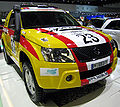2007 Suzuki Grand Vitara Owner's Manual - Page 166
2007 Suzuki Grand Vitara Manual
Page 166 highlights
INSPECTION AND MAINTENANCE C. Tire Size The tire size code is a combination of letters and numbers used to define a particular tire's width, height, aspect ratio, construction type, and service description. See the "Tire Size" explanation later in this section for more details. D. U.S. DOT Tire Identification Number The Department of Transportation (DOT) marking indicates that the tire is in compliance with the U.S. Department of Transportation Motor Vehicle Safety Standards. The letters and numbers following the DOT marking is the Tire Identification Number (TIN). The TIN identifies the tire manufacturer and plant, tire size, and date the tire was manufactured. E. Uniform Tire Quality Grading (UTQG) Tire manufacturers are required to grade tires based on three performance factors: treadwear, traction and temperature resistance. Refer to the "Uniform Tire Quality Grading" section for more details. F. Load Rating Load rating is the maximum weight a tire is designed to support in normal service. G. Max Inflation Pressure Max inflation pressure is the maximum inflation pressure a tire is designed for. H. Tire Ply Material These tire markings describe the type of cord and number of plies in the sidewall and under the tread. I. Load Index and Speed Rating The two- or three-digit number is the tire's load index, the maximum load a tire can carry at the speed indicated by its speed symbol at the maximum inflation pressure. The higher the number is, the greater the load carrying capacity. The letter symbol denotes the speed at which a tire is designed to be driven for extended periods of time. (Ratings are listed below.) Letter Rating Q R S T U H V W Y Speed Rating 99 mph 106 mph 112 mph 118 mph 124 mph 130 mph 149 mph 168 mph* 186 mph* 67D028 J. M+S Marking This marking indicates the tire has some mud and snow capabilities and is designed for all-season use. Tire Size The following illustration shows an example of a typical passenger car tire size. EXAMPLE A B C D E *The letters ZR may be used on tires with a maximum speed capability over 149 mph and will always be used on tires with a maximum speed capability over 186 mph. A. Tire Type This letter code indicates the primary intended use of the tire. The letter "P" identifies a tire primarily intended for use on a passenger vehicle. B. Tire Width This three-digit number indicates the tire section width in millimeters from sidewall to sidewall. C. Aspect Ratio This two-digit number represents the tire section height divided by the tire section width. 9-25
















